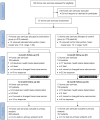Effects of advance care planning in care dependent community-dwelling older persons (STADPLAN): A cluster-randomised controlled trial
- PMID: 37310014
- PMCID: PMC10503242
- DOI: 10.1177/02692163231180322
Effects of advance care planning in care dependent community-dwelling older persons (STADPLAN): A cluster-randomised controlled trial
Abstract
Background: Most randomised controlled trials on advance care planning were conducted in people with advanced, life-limiting illnesses or in institutional settings. There are few studies on its effect in older people living in the community.
Aim: To determine the effects of advance care planning in older community dwelling people.
Design: The STADPLAN study was a cluster-randomised trial with 12 months follow-up. The complex intervention comprised a 2-days training for nurse facilitators that delivered a formal advance care planning counselling and a written information brochure. Patients in the control group received optimised usual care, that is, provision of a short information brochure.
Setting/participants: Home care services in three regions of Germany were randomised using concealed allocation. Care dependent clients of participating home care services, aged 60 years or older, and rated to have a life-expectancy of at least 4 weeks were included. Primary outcome was active participation in care at 12 months, assessed by blinded investigators using the Patient Activation Measure (PAM-13).
Results: Twenty-seven home care services and 380 patients took part. Three hundred seventy-three patients were included in the primary analysis (n = 206 in the intervention and n = 167 in the control group). There was no statistically significant difference between the intervention and control group with regard to the PAM-13 after 12 months (75.7 vs 78.4; p = 0.13). No differences in quality of life, anxiety and depression, advance care planning engagement, and in proportion of participants with advance directives were found between groups.
Conclusions: The intervention showed no relevant effects on patient activation or quality of life in community dwelling older persons, possibly indicating the need for more tailored interventions. However, results are limited by a lack of statistical power.
Trial registration: German Clinical Trials Register: DRKS00016886.
Keywords: Randomised controlled trial; advance care planning; end-of-life care; home care services; nurses.
Conflict of interest statement
The author(s) declared no potential conflicts of interest with respect to the research, authorship, and/or publication of this article.
References
-
- Glaudemans JJ, Moll van Charante EP, Willems DL. Advance care planning in primary care, only for severely ill patients? A structured review. Fam Pract 2015; 32(1): 16–26. - PubMed
-
- Rietjens JAC, Sudore RL, Connolly M, et al.. Definition and recommendations for advance care planning: an international consensus supported by the European Association for Palliative Care. Lancet Oncol 2017; 18(9): e543–e551. - PubMed
-
- Henry C, Seymour J. Advance care planning: a guide for health and social care staff. London: National End of Life Care Program, Department of Health, National Health Service UK, 2008.
-
- Brinkman-Stoppelenburg A, Rietjens JAC, van der Heide A. The effects of advance care planning on end-of-life care: a systematic review. Palliat Med 2014; 28(8): 1000–1025. - PubMed
Publication types
MeSH terms
Associated data
LinkOut - more resources
Full Text Sources
Medical
Miscellaneous


